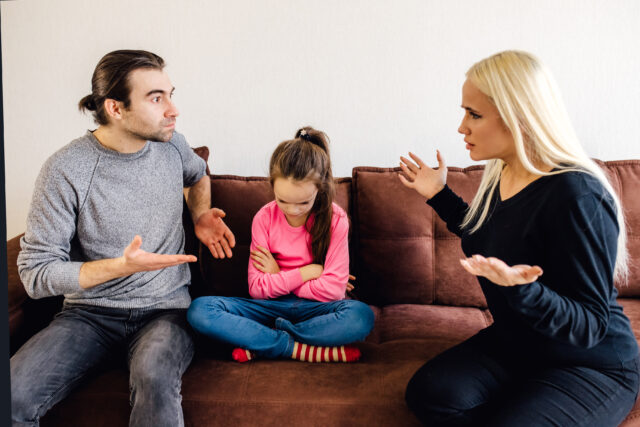Surviving childhood trauma often means carrying pain that no one else sees.

The thing is, healing doesn’t always come from pretending it never happened—it comes from facing it with honesty, and slowly rewriting what you believe about yourself. If you grew up around dysfunction, neglect, or emotional wounds, these truths are here to remind you that what happened wasn’t your fault, and your future doesn’t have to match your past.
1. You were never too sensitive—your environment was too harsh.

When you were young, being deeply affected by things might’ve been framed as a flaw. However, sensitivity isn’t weakness. Instead, it’s awareness. In a chaotic or unsafe environment, noticing everything wasn’t overreacting. It was survival. You picked up on changes in tone, silence, or danger because you had to.
What the world once labelled “too much” was often your way of staying alert in unpredictable situations. That level of awareness doesn’t make you broken, either. It makes you emotionally intelligent. You’ve likely spent your life feeling everything more deeply, and there’s power in that.
2. Your worth has never depended on how other people treated you.

When love or safety was inconsistent, it’s easy to grow up believing you’re only valuable when you perform, please, or prove something. But the truth is, how other people treated you says far more about their capacity than your worth.
Your value doesn’t vanish because someone failed to see it. The absence of care, respect, or affection doesn’t make you unworthy. It means they were unequipped to give what you needed. You’ve always been enough, even when people didn’t act like it.
3. It’s not your job to keep the peace at your own expense.

Many trauma survivors become experts at conflict avoidance. You learned how to smooth things over, minimise tension, and take the blame, even when it wasn’t yours to carry. But keeping everyone else calm shouldn’t come at the cost of your own wellbeing. Real peace includes you. You’re allowed to stop trying to rescue everyone from their own reactions. It’s okay to let people sit with discomfort instead of bending yourself into knots just to make things feel safe.
4. You are not responsible for your parents’ healing.

It’s common to grow up feeling like your family’s emotional state depends on you. Maybe you tried to be the ‘good kid,’ the fixer, or the reason they didn’t fall apart. However, children aren’t supposed to be emotional support systems for adults. You didn’t fail them; they failed you. Their healing, growth, or accountability is not your job. You deserve to heal for yourself, not to make peace with people who never gave you what you needed in the first place.
5. It’s normal to grieve what you never had.

You might feel silly or guilty for mourning a childhood that was absent of love, safety, or joy. But grief doesn’t just come from loss—it comes from lack. You’re allowed to be sad about the care you should’ve received but didn’t. That kind of grief can be quiet, delayed, or confusing, but it’s real. Letting yourself feel it doesn’t mean you’re stuck in the past. It means you’re finally facing it, so it doesn’t control you anymore.
6. You don’t have to explain your boundaries to be allowed to have them.

If you were raised around guilt trips, manipulation, or blurred lines, setting boundaries now can feel scary or selfish. The thing is, you’re allowed to protect your space, your energy, and your peace—without needing permission. Boundaries aren’t punishments. They’re clarity. You don’t owe anyone an essay explaining why you’re unavailable, uncomfortable, or unwilling. A simple “no” is enough, and your reasons are valid even if someone else doesn’t like them.
7. Your trauma doesn’t disqualify you from healthy love.

It’s easy to worry that because you’ve been hurt, you’re too complicated to love. Of course, the right people won’t see you as damaged. They’ll see your strength, your insight, your honesty. Not only that, but they’ll meet you with care, not judgement. You don’t need to hide your past to be worthy of connection. Healing doesn’t mean erasing where you’ve been. It means learning how to live with it differently, and knowing that your story is still unfolding.
8. Just because you’re used to something doesn’t mean it’s normal.

If chaos or neglect was your baseline, calm might feel unfamiliar—even uncomfortable. Sometimes we confuse emotional instability with passion, or silence with rejection, simply because that’s what we grew up around. But being used to dysfunction doesn’t make it okay. Part of healing is learning what actual safety and consistency look like, and giving yourself permission to want that, even if it feels strange at first.
9. You’re allowed to outgrow people who knew you when you weren’t okay.

As you heal, your needs and standards change. Not everyone will come with you, and that’s okay. Some relationships are built on versions of you that no longer exist, and holding onto them just because of history can keep you stuck. Outgrowing people isn’t betrayal. It’s self-respect. The more you step into who you are now, the more you’ll naturally create space for people who meet you there.
10. It’s okay if your healing doesn’t look graceful.
 Source: Unsplash
Source: Unsplash Healing is messy. It’s full of setbacks, contradictions, and days when you feel like you’re going backwards. That doesn’t mean you’re failing. It means you’re doing the real work of unlearning and rebuilding. You don’t have to be calm, patient, or ‘zen’ to be healing. Anger, sadness, and confusion are part of the process. You’re allowed to be imperfect while you figure it out.
11. You don’t need to prove your pain for it to matter.

If your trauma wasn’t obvious or visible to other people, you might question if it even counts. Of course, trauma isn’t about dramatic events—it’s about how things affected you. Your experience is valid, even if no one else saw it. You don’t have to justify your past by collecting evidence. If something hurt you, shaped you, or left you carrying weight that wasn’t yours—that’s enough.
12. You’re allowed to be angry.

Anger is often a taboo emotion, especially if you were taught to suppress it or pretend everything was fine. But anger is a healthy, protective response to injustice. Feeling it doesn’t make you ungrateful or unhealed—it makes you human. You’re allowed to feel it without guilt. You don’t have to rush to forgiveness just to seem “good.” Processing your anger is part of reclaiming your power.
13. You’re not behind in life—you started from a different place.

If it feels like everyone else had a head start, it’s probably because they did. You may have spent years surviving what other people never had to face, and that takes time, energy, and resilience most people won’t understand. You’re not late; you’re building something real. And every step forward, no matter how small, counts. Progress in silence is still progress.
14. It’s okay to rewrite your story, even if other people don’t agree.

Some people will insist your childhood “wasn’t that bad,” or that you should let things go. Of course, you’re the one who lived it. You don’t owe anyone a version of your past that makes them more comfortable. Reclaiming your truth doesn’t mean blaming or dwelling. It means choosing to see things clearly, so you can move forward on your own terms.
15. You’ve already done hard things most people can’t imagine.

Surviving childhood trauma means you’ve developed strength, intuition, and insight under pressure. You’ve navigated complex emotional terrain before you even had the words for it. You don’t need to be tougher—you already are. The fact that you’re here, reading this, and working through it, is a quiet kind of strength most people will never understand.
16. You’re allowed to feel joy without guilt.

Sometimes survivors feel like they don’t deserve happiness. Like if they laugh, relax, or enjoy something, they’re somehow betraying their pain. Joy is not a denial of your story, though. It’s part of healing from it. You’re allowed to chase moments that feel good. You don’t need to earn them. Your past doesn’t disqualify you from peace, laughter, or love—it makes them all the more meaningful when they finally arrive.




